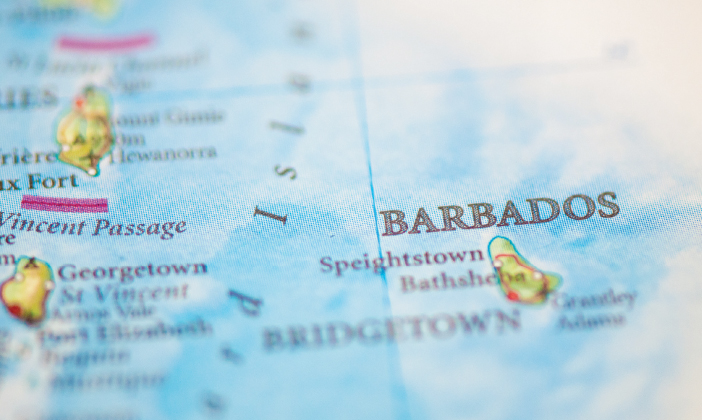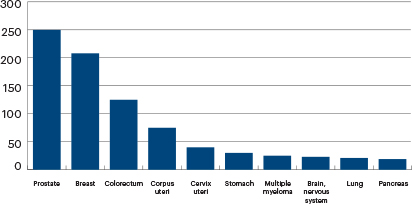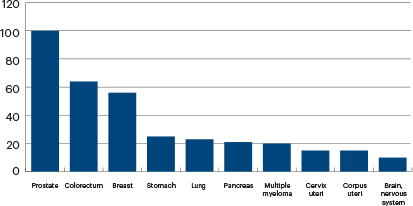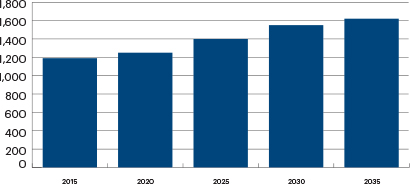
PHOTO: GETTYIMAGES
GUEST EDITOR

Chandrakanth Are, MBBS, MBA, FRCS, FACS
The ASCO Post is pleased to continue this special feature on the worldwide cancer burden. Each installment focuses on a country from one of the six regions of the world, as defined by the World Health Organization (ie, Africa, the Americas, South-East Asia, Europe, Eastern Mediterranean, and Western Pacific). In this issue, we feature a close look at the cancer incidence and mortality rates in Barbados.
Barbados is one of the Caribbean islands located in the Atlantic Ocean to the northeast of Venezuela. The island was uninhabited before the British established a settlement there in 1627. The economy initially remained heavily dependent on sugars, rum, and molasses production through most of the 20th century. In the 1990s, tourism and manufacturing surpassed the sugar industry in economic importance.1
According to the most recent estimate in July 2017, the population of Barbados is 292,336, with a median age of 38.6 years. The population growth rate is estimated to be at 0.28%. The current birth rate stands at 11.7 per 1,000 people, which is alarmingly close to the death rate of 8.6 deaths per 1,000.1

Mounika Addula, MBBS

Ujwal Yanala, MBBS
Barbados spends about 7.5% of its gross domestic product on health care, which puts the country at a rank of 64 among all the countries in the world. According to the 2012 census, Barbados has 6.2 hospital beds per 1,000 people and 21.1 doctors per 10,000 people—a physician distribution that is below the minimum standard established for this region by the World Health Organization (25/10,000).1,2 Currently, chemotherapy, radiotherapy, and community-based health-care practice are generally available to the majority of the country’s population.3
Although health-care expenditure and the number of doctors are better in Barbados than in many low- to middle-income countries, there are several limiting factors in cancer-related health care. Barbados does not have an adequate repository of cancer data to quantify the cancer burden. As a result, most of the data are extrapolated using national mortality estimates based on modeled survival.4
In 2007, the National Chronic Non-Communicable Disease Commission of Barbados was created with funding from a European development fund. The Chronic Disease Research Center of the University of the West Indies was contracted to implement and manage the Barbados national registry for noncommunicable diseases including cancer. This is the only national registry for cancer in Barbados, and its mission statement is to collect, collate, and disseminate timely and accurate national data on the occurrence of cancer (along with stroke and acute myocardial infarction) in order to help with the prevention, control, and treatment of cancer and other noncommunicable diseases.5 With these changes, cancer care in Barbados appeared to be advancing, although as of 2013, there was still no national cancer policy, strategy, or action plan.6,7

Since the mid-20th century, a number of changes in the lifestyle and dietary habits have been introduced into the country. They could be mostly attributed to increasing tourism and Westernization. Currently, tobacco and alcohol consumption, low fruit and vegetable intake, low physical activity, and obesity are some of the noticeable changes.8 All of these trends are known to be associated with different types of cancer. Within the past decade, the government of Barbados has introduced new health-care policies to curtail these high-risk habits.8

FIGURE 1: Top 10 cancers by incidence—current rates in Barbados.

FIGURE 2: Top 10 cancers by mortality—current rates in Barbados.

FIGURE 3: Trends in the incidence of new cancer cases in Barbados: 2015–2035.

FIGURE 4: Trends in cancer-related mortality in Barbados: 2015–2035.
There were 1,144 new cancer cases diagnosed in Barbados in 2015, with prostate, breast, colorectal, corpus uteri, and stomach being the most common types. Cancer-related mortality accounted for 523 deaths in 2015, with prostate, colorectal, breast, stomach, and lung cancers accounting for most of the deaths. It is predicted that in the year 2035, there will be 1,657 new cancer cases and 858 cancer-related deaths.9,10 It is likely that the rising median age in the country may contribute to a rising cancer burden in the years to come.
Several cancer prevention policies have been implemented in Barbados. With regard to tobacco control, all public places are completely smoke-free, and tobacco products are taxed at a very high rate of 49%. A new policy was initiated in 2009 to tackle the problem of overweight/obesity. Hepatitis B vaccination was introduced into the national immunization program in the year 2000, and as of 2012, an estimated 87% of the population received the required three doses.8
Note to Readers: If you are interested in participating in this continuing series on the global cancer burden and have an interesting perspective to share about a particular region of the world, contact Dr. Are at care@unmc.edu.
Cancer screening procedures are generally available to the majority of the population in Barbados. Clinical breast exam, education, and mammography are widely available in both the public and private sectors. Colonoscopy, fecal occult blood, and fecal immunologic testing are also widely available. Similarly, cervical cytology and visual inspection with acetic acid are generally available for cervical cancer screening. Although screening services are generally available, there are no local guidelines for the management of cervical, breast, or colorectal cancer.3
With the recent emphasis by the government of Barbados on the growing cancer burden and the new health-care policies, it is hoped that in the years to come, these efforts will help in tackling the rising cancer burden in the country. ■
Dr. Addula is a masters student in the Clinical & Translational Science Department, Creighton University, Dr. Yanala is a general surgery resident, University of Nebraska Medical Center, and Dr. Are is Jerald L & Carolynn J. Varner Professor of Surgical Oncology & Global Health; Associate Dean for Graduate Medical Education (DIO); and Vice Chair of Education Department of Surgery, University of Nebraska Medical Center, Omaha.
DISCLOSURE: Drs. Addula, Yanala, and Are reported no conflicts of interest.
REFERENCES
1. Central Intelligence Agency: Central America and Caribbean: Barbados. Updated August 14, 2018. Available at https://www.cia.gov/library/publications/resources/the-world-factbook/geos/bb.html. Accessed August 20, 2018.
2. World Health Organization: Barbados: WHO statistical profile. Updated January 2015. Available at www.who.int/gho/countries/brb.pdf?ua=1. Accessed August 20, 2018.
3. World Health Organization: Cancer Country Profiles, 2014. Barbados. Available at www.who.int/cancer/country-profiles/brb_en.pdf?ua=1. Accessed August 20, 2018.
4. Banydeen R, Rose AM, Martin D, et al: Advancing cancer control through research and cancer registry collaborations in the Caribbean. Cancer Control 22:520-530, 2015.
5. The Barbados National Registry for Chronic Non-Communicable Disease: The Barbados Cancer Society, March 2009. Available at www.bnr.org.bb/cms/index.php?option=com_content&view=frontpage&Itemid=1. Accessed August 20, 2018.
6. Samuels TA, Guell C, Legetic B, et al: Policy initiatives, culture and the prevention and control of chronic non-communicable diseases (NCDs) in the Caribbean. Ethn Health 17:631-649, 2012.
7. Unwin N, Samuels TA, Hassell T, et al: The development of public policies to address non-communicable diseases in the Caribbean country of Barbados: The importance of problem framing and policy entrepreneurs. Int J Health Policy Manag 6:71-82, 2016.
8. Government of Barbados, Ministry of Health, Planning and Research Unit: Chief Medical Officer’s Report, 2010-2012. Available at www.barbadosparliament.com/uploads/sittings/attachments/05530f55cc1d0cd01198dbc26b76209b.pdf. Accessed August 20, 2018.
9. Ferlay J, Soerjomataram I, Dikshit R, et al: Cancer incidence and mortality worldwide: Sources, methods and major patterns in GLOBOCAN 2012. Int J Cancer 135:E359-E386, 2015.
10. Ferlay J, Soerjomataram I, Ervik M, et al: GLOBOCAN 2012 v1.0, cancer incidence and mortality worldwide: IARC CancerBase No. 11 [Internet]. Lyon, France; International Agency for Research on Cancer; 2013. Available at globocan.iarc.fr. Accessed August 20, 2018.

